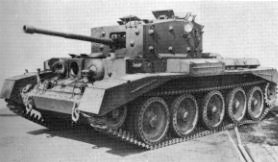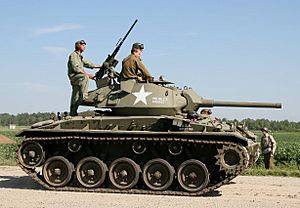Bill Bellamy (British Army officer) facts for kids
Quick facts for kids
Bill Bellamy
|
|
|---|---|
| Nickname(s) | "Bill" |
| Born | 1 December 1923 Northampton, Northamptonshire, England |
| Died | 18 March 2009 (aged 85) Barnstaple, Devon, England |
| Allegiance | |
| Service/ |
|
| Years of service | 1941–1955 |
| Rank | Captain |
| Service number | 267985 |
| Unit | 8th King's Royal Irish Hussars |
| Battles/wars | Second World War |
| Awards | Military Cross |
Captain Bill Bellamy (1 December 1923 – 18 March 2009) was a brave officer in the British Army during the Second World War. He served with the 8th King's Royal Irish Hussars from 1943 to 1955. He fought in the North African Campaign and was a key part of the D Day landings in Europe.
Bill Bellamy wrote a book called Troop Leader: A Tank Commander's Story. It shares his experiences of fighting in tanks during the war, based on his own diary. He was one of the first British soldiers to explore the damaged government buildings in Berlin right after the war ended in 1945. For his courage, he received the Military Cross on 5 March 1945 from Field Marshal Sir Bernard Montgomery. This award was for his bravery during a battle in the Netherlands in October 1944. He saved his burning tank and crew while under heavy enemy fire, then helped his fellow soldiers advance.
| Top - 0-9 A B C D E F G H I J K L M N O P Q R S T U V W X Y Z |
Early Life and Faith
Lionel Gale "Bill" Bellamy was born on 1 December 1923 in Northampton, England. He was the only son of Ronald and Olive Bellamy. His father was a salesman who fought in the First World War and was a prisoner of war in the Second World War. His mother was a dress designer.
Bill went to Hawthorn Community Primary School and then a boarding school called Blackfriars when he was 11. There, he became a Catholic. He always believed his faith gave him strength during the tough times of war.
Joining the Army
When Bill turned 18 in December 1941, he was called to join the army. This changed his plans to go to university. He joined the Royal Armoured Corps (RAC), hoping to serve with his father. He went for training at Bovington Camp in Dorset.
It was during this training that Lionel got his nickname, "Bill." He felt a bit shy about his real name and told the other soldiers his name was Bill. The name stuck with him for the rest of his life.
Becoming an Officer
After some training, Bill was chosen as a possible officer. He went to the Royal Military College, Sandhurst in August 1942, which is a famous place where army officers are trained. On 20 March 1943, he officially became a second lieutenant.
He successfully applied to join the 8th King's Royal Irish Hussars, a cavalry regiment. He later joined his regiment in Cairo, Egypt. The Hussars then sailed to England to prepare for D-Day, the big invasion of Europe.
Fighting in Europe
When the D-Day landings began, Bill was first in charge of supply vehicles. These vehicles brought important supplies to the soldiers. During the Battle of Villers-Bocage, his jeep was hit by enemy fire, and he was wounded in the head. Even with seven stitches, he stayed at his post.
After this battle, Bill became a troop leader, commanding his own Cromwell Tank. This was one of three tanks in his troop. On his very first day as a tank commander, he found two British armoured cars that had been hit by enemy fire. He bravely got out of his tank and rescued several crew members who were still alive inside the damaged vehicles.
This was just the start of many dangerous experiences for Bill as a tank commander. He faced a determined German army as they retreated through France, Belgium, and the Netherlands, and into Germany. His tank regiment was at the front of the fighting.
Awarded the Military Cross
On 22 October 1944, Bill's troop was helping infantry soldiers advance near Doornhoek in the southern Netherlands. They came under heavy enemy fire from guns, mortars, and artillery. Bill attacked the enemy positions, destroying three of them, and helped the infantry move forward.
His tank was hit by bullets, causing hot metal to splash on his face. His tank also entered a minefield and almost hit a mine. A can of petrol spilled and set his bedding on fire, but he managed to get his burning tank and crew to safety. Later, it was found that his beret had two bullet holes in it.
For his great bravery, Bill was given the Military Cross. Field Marshal Sir Bernard Montgomery personally presented him with this award on 5 March 1945.
Into Germany and Berlin
Bill had to return to England when his mother was sadly killed by a V-2 rocket in London. While there, he was in the hospital for an illness called jaundice. Some of his fellow officers had noticed that he was taking too many risks in battle, and this break might have been good for him.
When he returned to his regiment, they were near Harburg, Germany. Bill was given a new role as second in command of the Reconnaissance Troop. He was given a Chaffee tank for this new job.
After helping to free a prisoner of war camp, his regiment entered Hamburg after the city surrendered. Seeing the city and its people made him feel sad, and his feelings towards the Germans changed from hate to pity. After VE Day (Victory in Europe Day), he helped a Catholic relief group assist people who had been displaced by the war.
On 4 July 1945, Bill's regiment went to Berlin to take part in the victory parade. They stayed at the Olympic Stadium. Bill and some friends borrowed a jeep and explored the city's government area. They saw the burnt-out Reichstag and the Reich Chancellery, which was badly damaged but still mostly standing. They even found some small souvenirs from the building.
Bill noticed how the Russians treated the people of Berlin, and he felt they were being very harsh to punish the population. On 21 July 1945, his regiment marched in the victory parade. Bill was promoted to captain in August 1945.
After the War
Bill Bellamy became an adjutant for the 8th Hussars. In 1950, he was preparing his regiment to go to Korea, but he became ill with jaundice again. He was then transferred to the Northamptonshire Yeomanry and finally retired from the army in 1955.
Life After the Army
After leaving the army, Bill Bellamy joined a shoe company called Phipps and Son. He worked his way up to become the managing director and retired in 1983. He then became a local councillor in Great Brington, Northamptonshire.
Bill was also a Knight of the Holy Sepulchre, which meant he took a special interest in Christian Arabs in Palestine. For many years, he was the chairman of the Mayday Trust, which helps adults who need housing and support. He also supported the Cynthia Spencer Hospice in Northampton. In 2005, at 81 years old, he raised £30,000 for the hospice by trekking across Cuba!
Bill married Ann Burbury in 1950. They had four sons and one daughter: Simon, James, Andrew, Giles, and Sarah. Ann passed away in 2001, and Bill remarried Felicity Sidders in 2007. His son Andrew also joined the army and became a brigadier. Bill also helped two Palestinian students by paying for their trip to England for their studies.
Bill's wartime diary and photos stayed in his attic for forty years. When he found them again, he decided to write about his war experiences for his children. A publisher convinced him to publish the book, which became Troop Leader, A Tank Commander's Story in 2005. Bill Bellamy passed away from cancer on 18 March 2009.
 | Stephanie Wilson |
 | Charles Bolden |
 | Ronald McNair |
 | Frederick D. Gregory |



